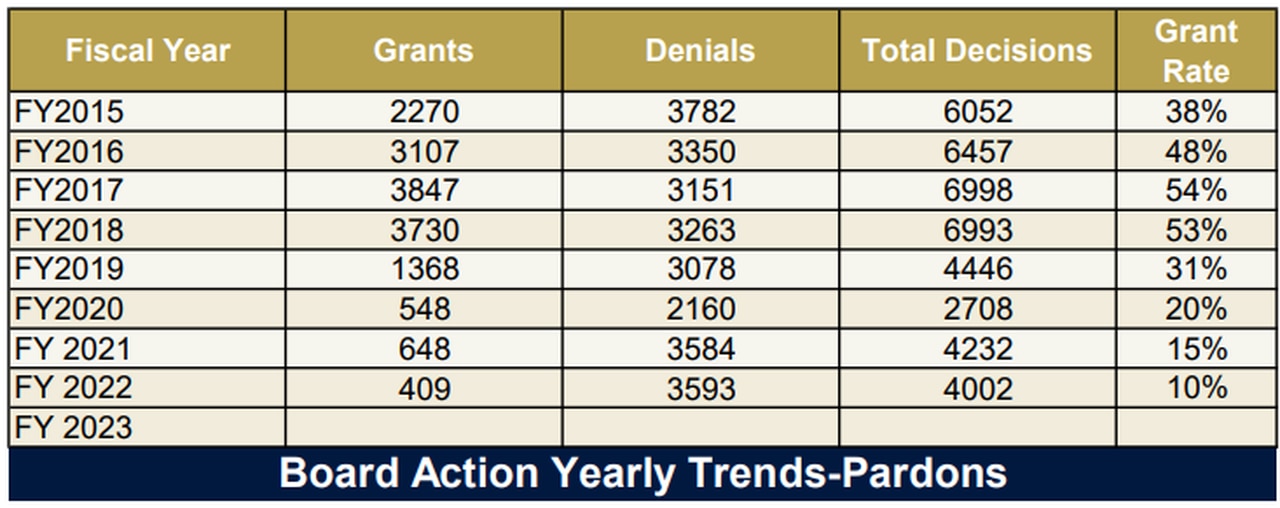Report says even low-risk inmates unlikely to get parole
The ACLU of Alabama said its observance of 267 parole hearings this summer showed that the low rate of paroles granted in Alabama cannot be fully explained by concern for public safety.
In a report released today, the ACLU of Alabama said the Alabama Board of Pardons and Paroles rarely granted parole even for inmates placed on work release by the Alabama Department of Corrections. Work release inmates should be good candidates for parole if the ADOC has classified them as safely able to work in the community, the report said.
The ACLU’s team observed 74 hearings for work release inmates, and 64 of those, 86%, were denied.
“The Parole Board’s decisions aren’t motivated by concerns for public safety,” Alison Mollman, Interim Legal Director at the ACLU of Alabama, said in a press release about the report. “Their decisions are retributive, racially disparate, and prevent people who could safely and responsibly reenter society from returning to their families. It is time for the Parole Board to follow the law and their own guidelines. It is time for incarcerated Alabamians to come home.”
Overall, the board denied parole for inmates at 248 of the 267 hearings the ACLU team watched, or 93%.
Those numbers follow a downward trend in paroles that started in 2019. The parole grant rate hit a new low last fiscal year, at 10%. In contrast, about half of paroles were granted from 2016 through 2018.
Here is a link to the ACLU of Alabama Parole Watch Report.
The ACLU of Alabama has criticized the parole board’s declining parole rate for several years, saying it contributes to problems in Alabama’s overcrowded, understaffed prisons, which the Department of Justice alleges holds men in unconstitutional conditions because of the violence.
State officials who have defended the parole board note that about 80% of the inmates in Alabama prisons are classified as violent offenders.
The rate of paroles granted by the Alabama Board of Pardons and Paroles has fallen sharply since 2019. (Chart from the Alabama Bureau of Pardons and Paroles.)
The Parole Board is a three-member board appointed by the governor and confirmed by the Legislature. The chair is Leigh Gwathney, a former Jefferson County prosecutor and assistant attorney general, who was appointed by Gov. Kay Ivey in 2019. The other members are Darryl Littleton, a former state trooper and executive security officer for the Alabama Law Enforcement Agency, who was appointed by Ivey in 2021, and Gabrielle Simmons, who was appointed last month after previously serving as director of board operations.
The board has not yet responded to a request for comments on the report.
In its report, the ACLU of Alabama said its purpose was also to shed some light on how the parole board works, noting that it is a process not well understood by the public.
In Alabama, inmates do not appear at parole hearings. Advocates for the inmate can speak at the hearing. The Alabama attorney general’s office and advocates for victims speak in opposition to parole at many of the hearings. The three-board members generally vote and announce their decisions at the conclusion of the hearing.
The ACLU of Alabama report says the attorney general’s office or the victim advocacy group VOCAL spoke in opposition to parole at 209 of the 267 hearings it observed. The board turned down parole in 202 of those cases, the report says.
Read more: Black men in Alabama prisons less likely to get parole, often serve more years than white prisoners
Alabama has granted parole to less than 8% of eligible prisoners
Alabama lawmaker renews call for new guidelines on whether to grant paroles
Alabama parole rate drops by half since Jimmy Spencer case
Alabama’s falling rate of paroles granted sparks call for reform
